At Answering Service Care, we have carefully compiled a comprehensive list demonstrating the various industries that utilize answering services. This list further highlights the specific segments within each industry that show a higher representation among the businesses we cater to. We believe our diverse client base offers a small-scale representation of the larger industry landscape as a whole, suggesting our data could indicate broader industry trends. Such insights provide a solid groundwork for businesses aiming to gain a deeper understanding of how answering services are employed across a wide range of different industries.
In this article, we’ll provide our key findings, break down each industry to explain the market share, as well as define how answering services can help.
Four Key Industries
Key Findings
Based on a rigorous methodology, our initial findings indicate that, out of the several thousand businesses we serve, the top four industries answering services aid are Contractors, Healthcare, Legal, and Real Estate. For a clearer picture of how these industries make up the answering service clientele, we have four key insights from our review:
- Contractors make up about 21% of businesses that use our answering service, with 31% of those being building equipment contractors.
- Healthcare takes just under 17% of the market share of our total answering service clients.
- Legal services make up a large portion of businesses using our answering services, but the most prominent segment is personal injury lawyers, accounting for 32% of the industry as a whole.
- Real estate data shows that 78% of our real estate answering service clients are classified with the NAICS 531390, including property managers and real estate appraisers.
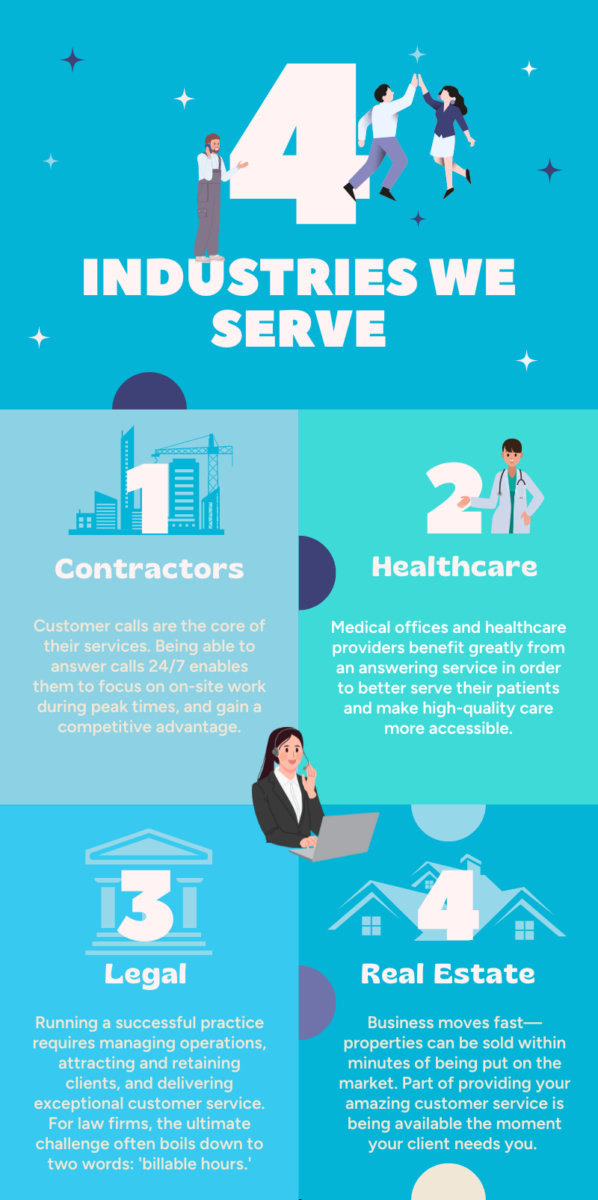
Four Key Industries Excelling with Answering Services
Answering services have become a cornerstone in various industries, playing a pivotal role in enhancing customer communication and operational efficiency. These services provide timely and personalized client interactions from healthcare to real estate. In this section, we explore the top four industries where answering services are not just useful but essential for business success and customer satisfaction.
Contractors
For contractors and home service providers, answering services are a fundamental business tool, ensuring they never miss a call or potential business opportunity, especially during peak seasons or busy workdays. These answering service providers efficiently handle inquiries, schedule appointments, and relay urgent messages, allowing contractors to focus on their on-site work without interruption. In an industry where timely response can be the difference between securing a job or losing it to a competitor, answering services provide a competitive edge by ensuring consistent availability.
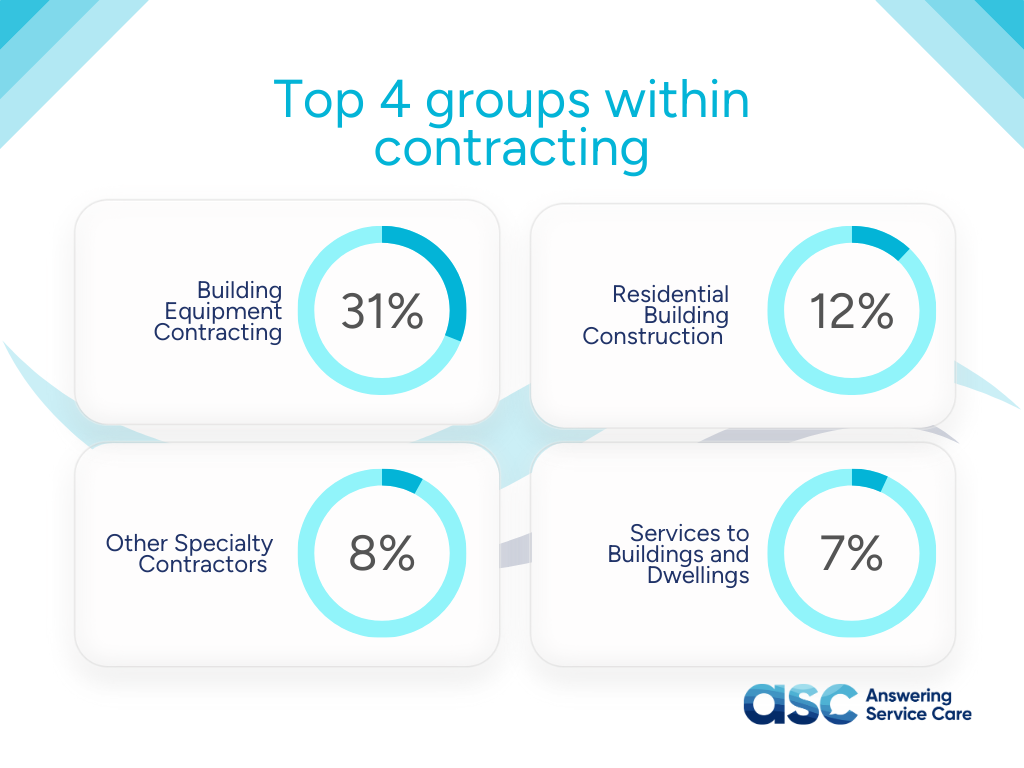
Answering services handle a significant segment of the contracting industry, with thousands of companies relying on our services in particular. This includes 31% of clients in the building equipment contracting sector, where consistent and effective communication with clients is crucial for project management and client satisfaction. Since this industry works directly with installing and maintaining building equipment, answering services help address clients’ concerns quickly, updating them on project progress and managing expectations. Because this sector represents a large portion of the contracting industry, it’s clear that other contracting businesses will benefit from answering services.
Residential building construction also forms a notable part of our client base—nearly 12%—underscoring another significant portion of the contracting industry focusing on direct interactions between residential business owners and their customers. Other segments of the industry include other specialty contractors (8%), services to buildings and dwellings (7%), and foundation, structure, and building exterior contractors (7%).
Overall, answering services offer a tailored experience specifically beneficial to the contracting industry. These services handle complex project inquiries, provide detailed updates to clients, and facilitate seamless coordination between contractors, suppliers, and clients. For example, in the building equipment contracting sector, answering services are instrumental in managing the intricate logistics of installing and maintaining building equipment. In short, answering services maintain client relations and manage project timelines for residential construction and other specialized sectors.
Healthcare
In the healthcare industry—where timely communication is crucial due to the sometimes urgent nature of medical needs—a key benefit of answering services is providing essential 24/7 support. This ensures that patient calls are handled punctually and, in addition to this constant availability, approached compassionately. Answering services are thorough in maintaining HIPAA compliance, safeguarding patient privacy, and efficiently managing appointments and emergency calls. By offering personalized patient interaction and bilingual support, answering services cater to diverse patient needs, enhancing overall patient satisfaction.
Additionally, answering services alleviate the administrative burden on medical staff, allowing them to focus more on patient care. Essentially, for medical practitioners, partnering with an answering service is a convenient way to connect with clients and a critical component in delivering effective healthcare.
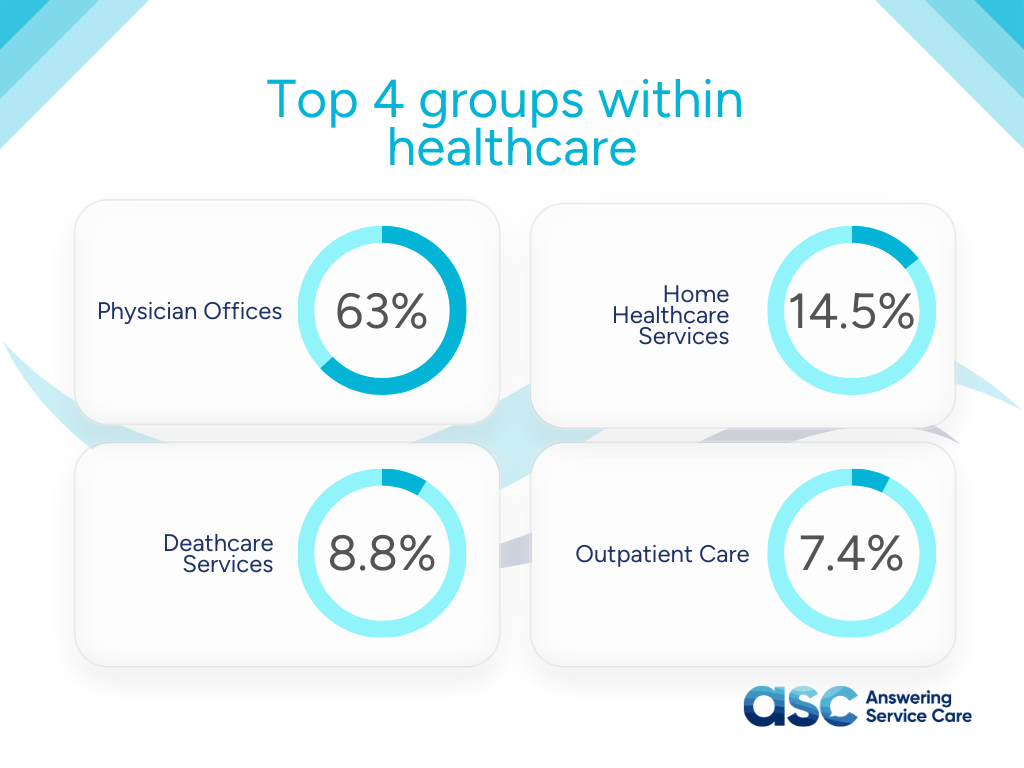
At Answering Service Care, we proudly serve a diverse range of companies in the healthcare industry, highlighting the substantial need for efficient communication solutions in healthcare. A significant 63% of those served in the industry are physician offices, where the prompt handling of patient calls is crucial for both emergency and routine care. Additionally, just over 14% of our clients are in the home healthcare sector, emphasizing the need for reliable communication channels for patients receiving care in their homes rather than only in-patient providers.
We also extend our services to other vital areas, such as outpatient care (7.4%) and deathcare services (8.8%). These sectors generally have unique communication needs that set them apart from general medical practices. For instance, in outpatient care, these services facilitate the coordination of follow-up appointments and treatment plans, which is crucial for patient recovery and continuity of care. And in other industries, like deathcare, answering services provide a sensitive and respectful communication touchpoint, essential for managing arrangements and providing support during emotionally challenging times.
These nuanced applications of answering services in the medical field underscore virtual receptionists’ versatility and vital importance in addressing the varied and complex communication needs across different healthcare sectors.
Legal
Answering services play a crucial role in the legal industry, where client interactions often carry significant legal implications—especially when it’s urgent. In this industry, answering services are essential for law firms to manage their calls quickly, effectively, and professionally. The effectiveness of these services is further boosted by industry-specific training tailored to the unique requirements of legal practice. This is key to maintaining client trust and adhering to legal deadlines. Professional answering service operators generally serve as reliable liaisons for clients, ensuring their concerns are recognized and resolved, even when attorneys are in court or otherwise occupied.
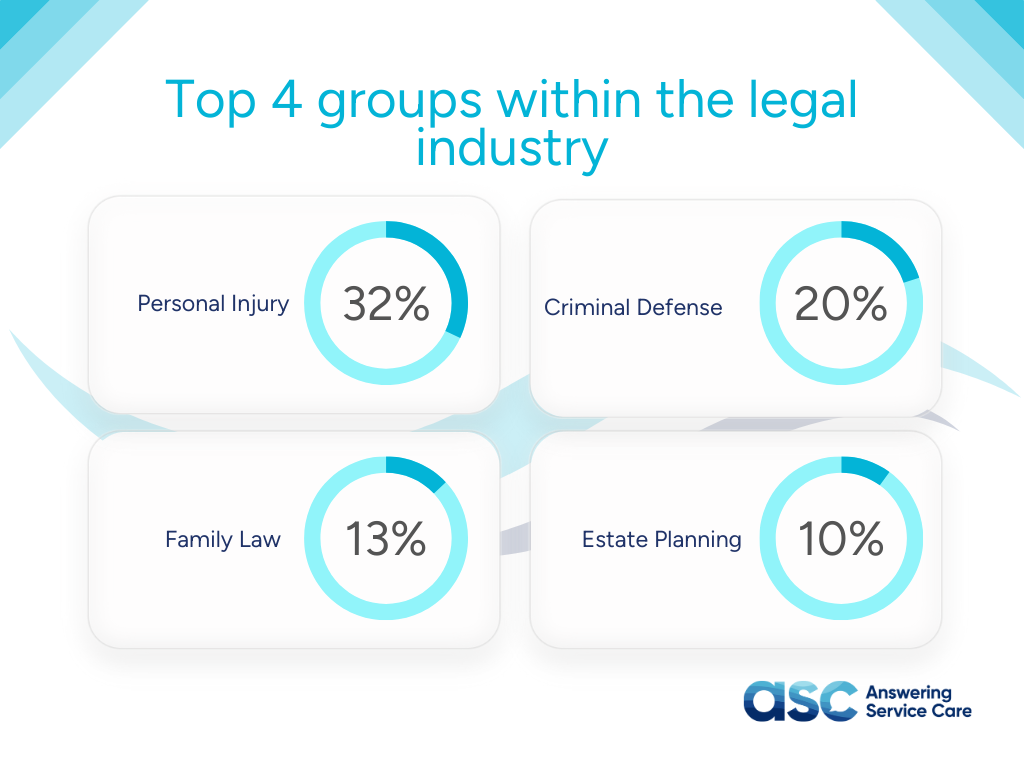
Answering services provide essential support to a wide array of clients in the legal industry, serving 252 law firms in total. With 32% of the law firms we serve operating within personal injury, it’s clear that a significant portion of the industry focuses on assisting citizens with their unexpected injuries or impairments. Second only to personal injury, our services also cater to large sectors such as criminal defense (20%). This statistic reflects the high volume of criminal defense cases and the consequent demand for legal representation for those facing criminal charges.
Though smaller in percentage, other notable sectors in law include family law (13%) and estate planning (10%). Sectors like real estate, civil litigation, and employment litigation also significantly rely on answering services for their operational efficiency. According to our data, real estate (8%), civil litigation (nearly 7%), and employment litigation (6%) account for 53 law firms focused on these legal matters—among others, as many law firms offer more than one service.
It’s noteworthy how answering services distinctly support the legal industry in areas beyond general practice. With personal injury lawyers, answering services ensure immediate and empathetic responses to distressed clients—which is especially important given the time-sensitive nature of such cases. On the other hand, for criminal defense, family law, and estate planning, the precise and confidential handling of communications by answering services aids in managing complex case details and sensitive client information. In other specialized sectors like real estate, civil litigation, and employment law, the role of answering services extends to coordinating various legal processes, handling intricate negotiations, and providing timely updates to clients.
This level of support is indispensable for law firms managing a diverse range of legal challenges. This contributes to improving not only case-related communications and client satisfaction but also the delivery of fair and timely justice.
Real Estate
Answering services play a pivotal role in the real estate industry by ensuring that agents never lose an opportunity due to missed calls. Acting as an essential point of contact, they offer prompt responses to both buyers and sellers, which is crucial in a market where timing can make or break a deal. By managing calls, scheduling property viewings, and providing information to clients, answering services enable real estate agents to maximize their availability and responsiveness, even when they are out in the field.
This level of support not only enhances customer service but also helps in building and maintaining client relationships. Importantly, this approach is a critical factor in the success of any real estate business. In general, for real estate agents, employing an answering service is a strategic investment in improving their business efficiency and elevating their client engagement.
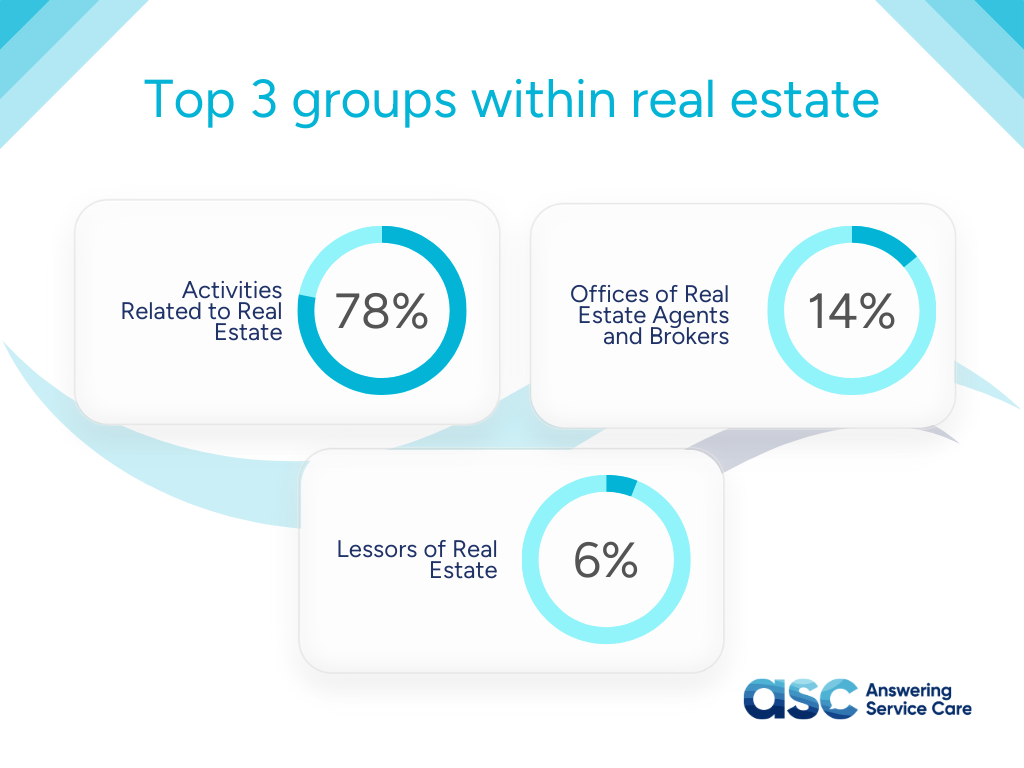
Answering services are integral to the operations of the real estate industry, as we service a total of 389 companies. 78% of these clients are engaged in property management and real estate appraising—reflecting the essential need for responsive communication in an industry where opportunities are fleeting, and timing is everything. A significant portion of our clientele also comprises offices of real estate agents and brokers (just over 14%) and lessors (6%), professionals who rely on our services to manage the high volume of inquiries and appointments that are central to their success.
Overall, answering services play a crucial role in distributing detailed property information and answering inquiries from potential buyers—acting as an extension of a real estate agent’s marketing and sales efforts. Moreover, these services effectively engage and educate clients on market trends, property details, and investment opportunities. Overall, this approach helps clients in their decision-making process.
The use of answering services in this large and versatile industry is essential for real estate agents—it ensures client satisfaction, builds trust, and ultimately drives successful real estate transactions.
Methodology
To determine the representation of industries utilizing answering services, Answering Service Care employed a comprehensive methodology centered around analyzing our current customer base. The process involved the following steps:
- Data Aggregation: We gathered extensive customer data across various sectors by accessing information stored in multiple data sources, including billing platform and CRM software, as well as CDR call data to trend call traffic utilization. This approach ensured a holistic view of our clientele, encompassing a wide range of industries and sub-groups.
- Industry Classification: Each customer was categorized based on their industry and relevant sub-group. This classification allowed us to identify specific sectors and niches that predominantly use our answering services.
- Analysis and Synthesis: The data from these diverse sources were compiled and analyzed to understand the distribution and prevalence of answering service usage across different industries. This analysis provided insights into patterns and trends, highlighting which sectors rely most heavily on our services.
- Quality Assurance: The data was cross-verified across different platforms and with internal records to ensure accuracy and reliability. This step was crucial in validating the findings and ensuring our conclusions were based on consistent and comprehensive data.
Through this detailed and analytical approach, Answering Service Care was able to effectively map out the landscape of answering service usage across industries, providing a thorough and accurate representation of our customer demographics and their industry affiliations.
Promoting Fair Use of Industry Representation Data
We encourage the fair use of this data by other businesses for their own research and articles. Our compiled data offers a representative snapshot of the industry, reflecting the wide-ranging utilization of answering services across various sectors.
Guidelines for Fair Use:
- Educational and Informative Purpose: We advocate for using our data in contexts that aim to educate and inform. Businesses, researchers, and content creators are welcome to reference our findings to enhance their understanding of industry trends and to provide informative content to their audiences.
- Accuracy and Integrity: While using our data, we urge users to maintain the accuracy of the information and to represent it honestly without altering its intended meaning or context.
- Source Attribution: Proper attribution should be given to Answering Service Care as the source of the data.
- Non-Commercial Use: The data should primarily be used for non-commercial, informational purposes.
By sharing our data, we aim to contribute to a broader understanding of how answering services are integrated across different industries. This collective knowledge can benefit businesses looking to benchmark their practices, for industry analysts examining market trends, and for academic purposes. The data, representing a cross-section of the industry, provides a valuable resource for all these users, fostering an environment of shared learning and growth.






